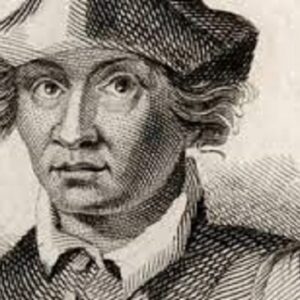Roger Bacon, OFM was a 13th-century English philosopher and Franciscan Friar who was posthumously awarded the scholastic honor “Doctor Mirabilis,” which translates as “Amazing Teacher.” Although little is known for certain about him or his family, it is believed that they were wealthy and were exiled during the reign of King Henry III of England. He completed his education at Oxford and began teaching there shortly thereafter. He was a disciple of Robert Grosseteste, a renowned scholastic philosopher and theologian. He lectured at Oxford and later at the University of Paris on the importance of Aristotle’s modern scientific methods. He invested a large sum of money, inspired by Aristotle and the Muslim scientist Alhazen, in gathering secret books, conducting experiments, and learning foreign languages. He joined the Franciscan Order as a Friar, but his relationship with the other members was strained, and his beliefs resulted in disagreements and, ultimately, imprisonment/house arrest. Rather than being a modern thinker, scholars now regard him as a brilliant educator who recognized the benefits of new learning and the importance of philosophy at the right time. He is also credited with inventing gunpowder and reforming the calendar, as well as for foretelling the development of submarines, automobiles, and aircraft.
Childhood & Adolescence
Roger Bacon was born in the Somerset town of Ilchester. His exact year of birth has always been a point of contention, with historians putting it at 1213 or 1214, based on his statement in the 1267 book ‘Opus Tertium’.
Today, all that is known about his family is that they were quite wealthy, but during Henry III’s reign in England, the majority of them were exiled and their property was annexed.
Geometry, arithmetic, music, astronomy, and the classics were among his early subjects of study. He attended Oxford University for further education and developed an interest in natural philosophy and mathematics. It is believed that he earned his M.A. in 1240 at either Oxford or Paris.
Career of Roger
Roger Bacon earned a master’s degree from Oxford. He lectured at the faculty of arts on a variety of subjects, primarily Aristotelian and pseudo-Aristotelian treatises.
His subsequent appointment was at the University of Paris, which he joined between 1237 and 1245. He discussed the Aristotelian Corpus (Aristotle’s Collected Works) in this section, which included physics, metaphysics, and the pseudo-Aristotelian De Vegetabilibus and De Causis.
In 1247, inspired by Robert Grosseteste, he began investing his time and money in acquiring secret books, training assistants, meeting savants, and constructing instruments. He devoted his life to the study of optics, alchemy, astronomy, and linguistics.
With some certainty, he entered the Franciscan Order as a friar in 1256, and in 1260, Master General Bonaventure issued a decree prohibiting friars from publishing books without the prior approval of the Order.
Due to their divergent beliefs, Bonaventure and Bacon remained at odds. Bonaventure believed that astrology was useful for predicting only those events that were solely determined by the movement of celestial bodies and that base metals could not be converted into gold or silver; Bacon disagreed on both counts.
He contacted Cardinal Guy le Gros de Foulques, who became Pope Clement IV in 1265, in order to circumvent the Order’s decree. The Pope requested Bacon’s philosophical writings and his opinion on the possibility of philosophy in theology via a papal mandate.
Roger Bacon responded by sending his ‘Opus Majus,’ ‘Opus Minus,’ and ‘De Multiplicatione Specierum.’ He discussed in his books how science and Aristotle’s philosophy could be applied to establish a new mode of learning that would also benefit the Church.
His luck ran out in 1268, when the Pope died, leaving no official review or opinion on his works. ‘Communnia Naturalium’, ‘Communia Mathematica’, and ‘Compendium Studii Philosophie’ were his subsequent works. Between 1277 and 1279, the Order placed him under house arrest due to his alchemical beliefs and general contempt for other innovators.
He believed that humans were incapable of educational reform until they eliminated frail and unsuitable authority figures, abolished long-standing customs, ceased supporting uninformed popular opinions, and concealed their ignorance through apparent wisdom.
His book, ‘Epistola de Secretis Operibus Artis et Naturae, et de Nullitate Magiae’ (Letter on the Secret Workings of Art and Nature, and on the Vanity of Magic), was critical of magical practices and contained the formula for the philosopher’s stone and possibly gunpowder.
He was an opponent of the Julian calendar, proposing that one day be omitted every 125 years to compensate for the error. He believed that Christians were celebrating Easter on the wrong day due to calendar errors in the modern era.
Significant Works of Roger
Roger Bacon is widely regarded as one of the earliest European proponents of modern scientific methods, which rely on experimental evidence rather than solely on the findings of predecessors.
He used fragments of glass spheres as magnifying glasses to demonstrate that light reflects from objects rather than is emitted from them, and he introduced a mixture capable of being used to make gunpowder for the first time.
Personal History and Legacies
In 1292, Roger Bacon died. Numerous books about him have been written, including ‘Doctor Mirabilis,’ ‘The Face in the Frost,’ ‘Fifth Business,’ and ‘The Black Rose.’
Estimated Net Worth
The estimated net worth of Roger is about $7.5million.


